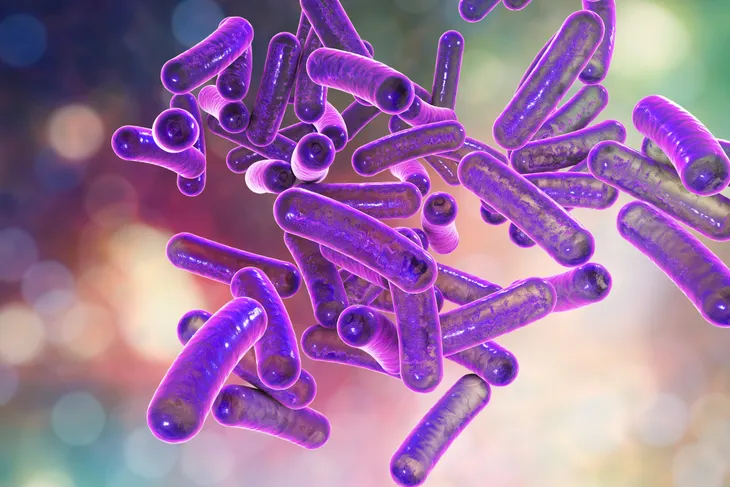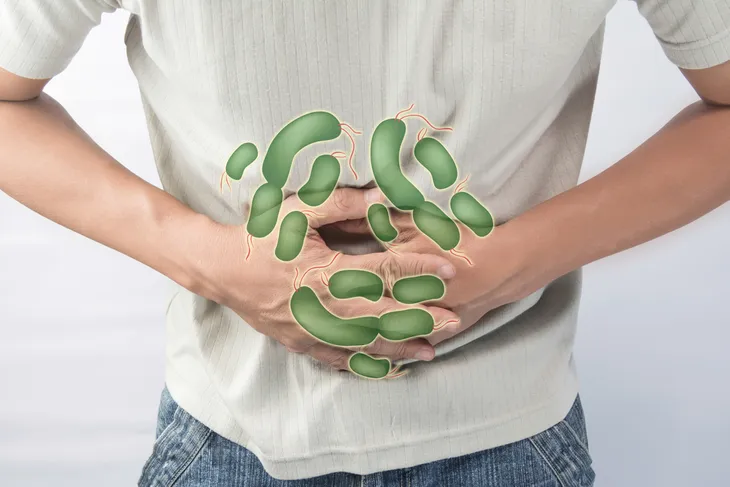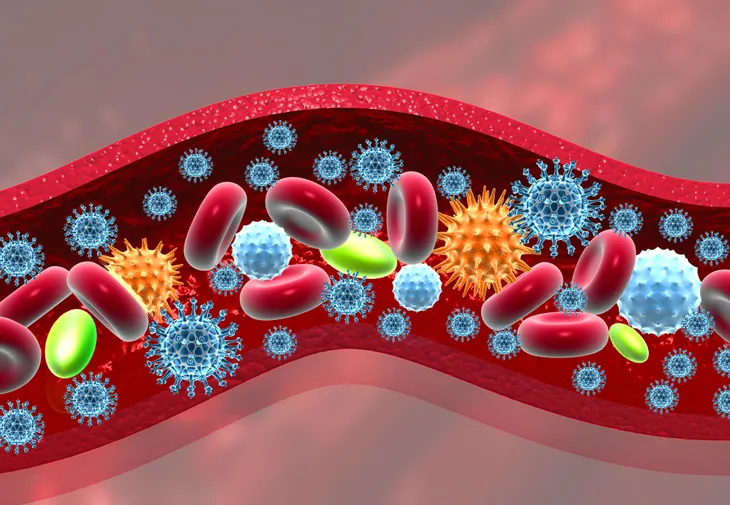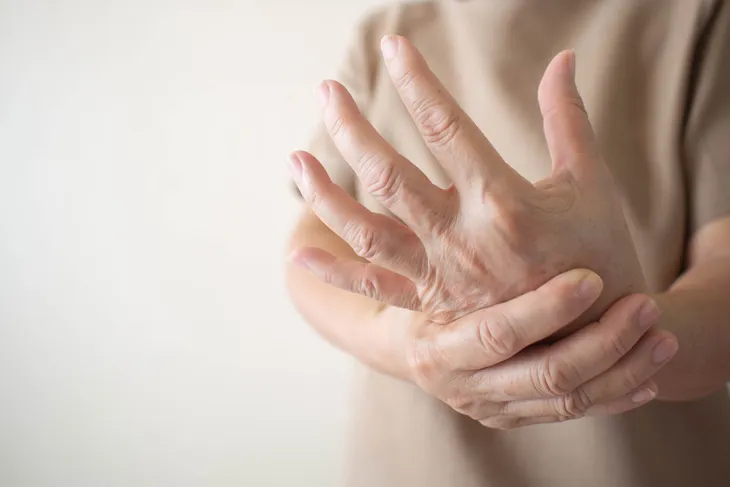- Shigella infection is caused by shigella bacteria which results in a disease that affects the digestive system.
- The most common symptoms of a shigella infection is diarrhea, but it can also cause fever, nausea, vomiting, and abdominal pain.
- Shigella bacteria is spread through the feces of an infected person (coming into contact with their stool), or by eating or drinking contaminated food and water.
- Treatment depends on how severe the infection is. In most cases, a shigella infection will clear up on its own at home within a couple days.
You might have never heard of it, but shigella is a problem that affects people all over the world. In fact, the Cleveland Clinic states there are about 188 million cases each year. Approximately 450,000 of these occur in the United States in regions with poor sanitation or overcrowded places, such as daycare centers, nursing homes, and schools.
Shigella infection, also known as shigellosis, is caused by shigella bacteria. As a type of food poisoning, its effects are felt most in the digestive system. It’s highly contagious and most often spread through food or contaminated water. Here’s more information on what Shigella is, the symptoms, causes, and treatment options…
What is Shigella?
Shigella infection is an intestinal infection caused by a family of bacteria known as shigella which results in stomach pain, diarrhea, and fever. It is considered a type of food poisoning because people usually get it by eating or drinking contaminated food or water. You can also get it from swimming and accidentally swallowing some contaminated water, explains the Cleveland Clinic.
While it can happen to anyone, it commonly occurs in children under 5 who often put their hands in their mouths. If the case is mild, it’ll clear up on its own within a week. If treatment is needed, a doctor can prescribe antibiotics.
Most Common Symptoms
Since shigella is a type of a food poisoning that occurs in the digestive tract, the most common symptom is diarrhea. WebMD warns that stools may be bloody or contain mucus. You might also experience a fever, nausea, vomiting, cramping in the stomach and abdomen area, as well as tenesmus (the feeling of needing to go to the bathroom even when there is nothing left in the intestines).
These symptoms usually begin one or two days after coming in contact with shigella. Sometimes even as little as 12-hours, notes Healthline. They may last anywhere from 5 to 7 days, with a mild case clearing up on its own within a couple days (a week at most). Some people won’t get any symptoms, but WebMD notes that asymptomatic individuals can still spread the disease.
Severe Symptoms and When to Call a Doctor
According to the Centers for Disease Control and Prevention (CDC), people who have the following symptoms in addition to diarrhea should call their doctor: fever, bloody diarrhea, severe stomach cramping or tenderness, and dehydration. Healthline also suggests calling a doctor if diarrhea lasts longer than 3 days or are unable to keep food and water down.
WebMD notes that shigella symptoms can be much worse for seniors, infants, or people with chronic illnesses. “People who are in poor health or whose immune system are weakened from diseases (such as HIV) or medication treatments (such as chemotherapy for cancer) are more likely to get sick for a longer period of time,” writes CDC. The same source advises these people to contact their doctor if they experience symptoms of shigella.
How Do You Get Shigella?
Shigella is a bacteria that can enter into the body, pass through the stomach and then multiply in the intestines. Once in the intestines, it spreads into the large intestines (also known as the colon), explains WebMD, which results in cramping and diarrhea.
The body gets rid of the bacteria through human feces which is also how the disease spreads. A person becomes infected when they accidentally swallow or ingest shigella bacteria. “The disease spreads when bacteria from the stool of the sick person go to the mouth of another person,” writes WebMD.
Common Ways Shigella Spreads
The most common way shigella is spread is by touching contaminated objects. For example, WebMD explains that a parent or childcare provider may change the diaper of a child who has shigellosis. If they don’t wash their hands properly, they could leave bacteria on the next thing they touch (i.e. change table, toys, and doorknobs). “The people who touch those infected surfaces can get infected — especially if they touch their mouths or swallow something using their contaminated hands,” writes the source.
Another potential way to spread shigella is by handling or preparing food while infected with shigella. If a sick person prepares food or does so with unclean hands, the food can become tainted. Fruit and vegetables can also be grown in a field that has been contaminated with human feces. It can spread through intercourse or last but not least, swimming in pools or ponds and accidentally swallowing contaminated water.
Complications of Shigella
Seizures
This potential complication occurs in young children, particularly those with a high fever. However, the Mayo Clinic says they can also occur in those without a high fever. It’s unclear whether these seizures happen as a result of the shigella, or the high fever.
According to the CDC, generalized seizures have happened in young children with shigella infection and often go away on their own without treatment. “Children with shigella infection who experience seizures typically have a high fever, low blood sugar, or abnormal blood electrolytes (salts),” writes the source. Health experts still do not know why these seizures occur.
Bloodstream Infection
A shigella infection has the potential to damage the lining of the intestines, warns the Mayo Clinic. This is rare, but if the intestines become damaged, shigella bacteria can enter the bloodstream and cause a bloodstream infection. It only happens in about 0.4 to 7.3-percent of people, says the CDC, and is most common among people with a weakened immune system and children.
“Bloodstream infections are most commonly seen in infections caused by S. flexneri and S. dysenteriae,” writes the CDC. “Shigellosis patients with bloodstream infections are at a higher risk of [fatality] compared to those with without bloodstream infections.”
Arthritis
Arthritis can develop as a reaction to an infection. If a person gets reactive arthritis, they will notice joint pain and inflammation in their body. The most commonly affected areas are the ankles, knees, feet and hips. You might also experience redness, itching and discharge in one or both eyes (conjunctivitis) and painful urination (urethritis), says the Mayo Clinic.
The CDC reassures that reactive arthritis only occurs in about 2-percent of people with a shigella infection and only happens with certain types of shigella. The most common is shigella flexneri and typically occurs in people with a specific genetic makeup. The source also points out that if it does occur, it lasts for only 3 to 5-months. Occasionally it will carry on for years and turn into chronic arthritis.
Dehydration
Anytime a person is dealing with diarrhea, they are at risk of becoming dehydrated. WebMD explains that dehydration occurs when there isn’t enough fluid in your system. Since shigella causes diarrhea that can span over several days, and sometimes be severe, dehydration is a real risk.
Keep an eye out for any signs of dehydration which include lightheadedness, dizziness, lack of tears in children, sunken eyes, or dry diapers, warns the Mayo Clinic. If a person develops severe dehydration they are at risk of going into shock. If it’s bad enough, it can even be fatal.
Other More Rare Complications
In addition to the complications listed above, there are a few others that can happen, but they are much more rare. One example is toxic megacolon which is when the colon becomes paralyzed, says the Mayo Clinic. When this happens, it becomes impossible to pass a bowel movement or pass gas. Signs to watch for are stomach pain and swelling, fever, and weakness. This condition must be treated otherwise the colon may rupture, leading to peritonitis which is a life-threatening infection that requires emergency surgery, warns the source.
A very rare complication of shigella is hemolytic uremic syndrome. While it’s more commonly caused by a type of E. coli bacteria than by shigella bacteria, it can “lead to a low red blood cell count (hemolytic anemia), low platelet count (thrombocytopenia) and acute kidney failure,” writes the Mayo Clinic. The CDC adds that this complication most commonly occurs in children and is potentially life threatening.
Who is Most at Risk?
While shigella can happen to anyone, children under 5 are among the highest risk and most commonly affected by shigella. This is likely due to the fact that they often put unwashed hands in their mouth after touching surfaces that can be contaminated with shigella, explains the CDC. These germs spread easily among children and family members and outbreaks often occur in school or childcare settings.
Other risk factors include people living in group housing or participating in group activities. “Close contact with other people spreads the bacteria from person to person,” writes the Mayo Clinic. These types of places include community wading pools, nursing homes, jails, and military barracks. You might also be at risk if traveling in areas that lack sanitation or men who engage in intercourse with other men, notes the source.
Treatment Options for Shigella
The form of treatment a person receives for shigella depends on the severity of the infection. Mild cases typically resolve on their own within a week with some rest and lots of fluids to prevent dehydration. Healthline warns not to take any medication for diarrhea because it will slow the bowel down and keep the bacteria in your system longer.
If the infection is moderate to severe it may require medication treatment. In this case, a doctor will likely prescribe antibiotics to help “eliminate the bacteria from your digestive tract,” says Healthline. Hospitalization from a shigella infection is very rare. If it does happen it’s likely from extreme nausea or vomiting in which case they’ll provide intravenous fluids and medication.
How to Prevent Shigella
There is no vaccine or cure for shigella. The best form of treatment is prevention! You can avoid getting shigella in the first place by practicing good personal hygiene. Healthline advises washing your hands often and with warm soapy water. This is especially necessary after using the bathroom or changing diapers. Discard dirty diapers in a closed bag or trashcan to stop bacteria from spreading. Always wash your hands before preparing a meal or handling food. Wipe down all surfaces in the kitchen with antibacterial wipes before and after use.
Healthline also warns people to stay away from people who have shigellosis until several days after their diarrhea has ended. “People who have shigellosis shouldn’t prepare food for others until they feel better and stop having diarrhea,” writes the source. To be extra cautious, a doctor can even perform a stool test to ensure shigella is no longer present.
















